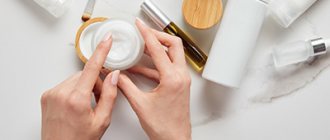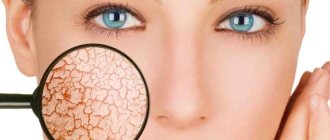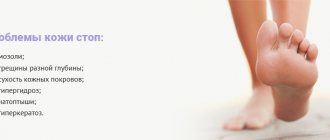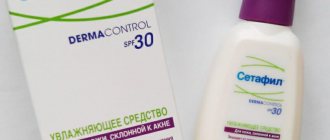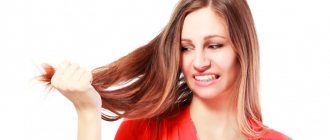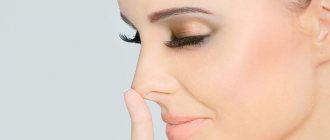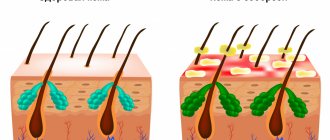If the scalp itches and flakes, various dermatological pathologies are most often suspected - psoriasis, seborrhea or eczema. Symptoms of diseases differ; only a dermatologist or trichologist can determine them. In women, peeling of the upper layer of the epidermis may appear due to hormonal changes (during pregnancy, menopause) and the use of low-quality cosmetics. Increased physical (more typical for men) and emotional stress also lead to activation of fungal microflora.
For the treatment of adult patients, special drugs and folk remedies are used. In infants, the skin often peels off all over the body, but this is not a pathology. Such symptoms go away on their own. Scabs on children can be moistened, softened, and then carefully combed out. If peeling and itching begins in an older child, then this is a sign of a disease, the treatment of which is carried out in the same way as in adults.
- Vichy Dercos shampoos
- Onion mask
Itchy scalp - main causes and treatment
Stress
Your head may itch in response to physical or emotional stress. In general, with a large release of adrenaline, the skin may itch - to a greater or lesser extent, depending on individual characteristics. Unpleasant sensations in this case are provoked by the breakdown of adrenaline. Physical overexertion is also fraught with metabolic disorders and local microinflammatory processes - this provokes the appearance of itching and swelling of tissues.
Allergy
An allergic reaction, expressed in the desire to scratch the scalp, may be associated with the cumulative effect of using a product that is not suitable for you: perfume, shampoo, conditioner, etc., and can also occur situationally - immediately after using a product with an allergen. Everyone's skin and body react differently. What suits your friend may not necessarily suit you. Allergic reactions vary from person to person. To exclude the allergen from daily care and select suitable products, you need to consult a trichologist.
Skin diseases
Skin diseases such as atopic dermatitis, seborrhea, psoriasis, etc., are manifested by sensations of itching, burning, and inflammation of the skin. If there is one or another disease of the scalp, patients complain of dandruff, crusts, sores, and hair loss. Typically, patients with these pathologies have scalp that is either dry or excessively oily. In this case, the ends of the hair may be dry and the roots may be greasy.
Lack of skin hydration
The use of unsuitable cleansers, abuse of styling products, over-drying the hair with a hairdryer, going to the sauna, constantly wearing a hat, an imbalance of vitamins, acids, and microelements lead to disruption of the protective functions of the skin and a decrease in its level of moisture. Dry skin saves itself by producing more sebum. And this pollutes the hair, gives a person an unkempt appearance, and most importantly, does not eliminate the root cause of the problem. The body wants to help itself, to compensate for the lack of moisture in the cells. From a cosmetology and trichology perspective, we can help the skin become more hydrated with suitable home care products and injectable mesotherapy.
Violations of the integrity of the skin
Damage to the skin - burns, cuts, other injuries - while healing, cause unpleasant sensations - itching and a feeling of tension. By the way, sometimes a vicious circle arises: the head itches due to one pathology or another, a person scratches it until it bleeds, and when it heals, the skin begins to itch again...
Parasites
Lice, fleas, and other parasites cause itching and burning sensations resulting from their bites. Parasitic infections are the most common cause of scalp discomfort. Parasites often affect children, so kindergartens and schools pay great attention to visual inspection of the scalp and hands. Fortunately, modern means make it possible to remove parasites not in a radical way (you don’t have to shave your head), but simply by washing your hair or using special lotions.
Fungus
Fungal infections that provoke itching are associated with increased activity of one or another fungus living on the surface of the body. The most common type of fungal infection is lichen. You can catch lichen in the pool, sauna, gym, or when using other people's hygiene items. And, by the way, it can affect not only the scalp, but also other areas of the body.
Diabetes
An increase in blood sugar levels leads to a desire to scratch, so patients with diabetes often have an itchy head, dandruff, and hair loss.
Advantages
Smart medicine for smart people
Safe, effective and natural rejuvenation
The best technologies for communicating with patients
We don't just take care of your beauty - we recharge you!
Types of seborrhea of the scalp with developed seborrheic dermatitis
Seborrhea on the head has three types:
1) Dry seborrhea.
Accompanied by abundant dandruff, the scalp becomes irritated and very sensitive, hair becomes dry and brittle, and hair loss often begins. Visually, it seems that the scalp does not produce enough oil and many people mistakenly believe that they simply have dry skin, although in fact it is a variant of seborrheic dermatitis.
2) Oily seborrhea.
It often occurs during adolescence, during a period of hormonal imbalance in the body, but can occur at any age. Depending on the composition of sebum, oily seborrhea can be liquid or thick.
- liquid seborrhea is characterized by severe itching and hair loss. Hair acquires an unhealthy shine and becomes greasy very quickly.
- thick seborrhea. A characteristic symptom is thick, oily dandruff, which can tightly clog the sebaceous ducts and thereby provoke inflammation. If complications occur, suppuration may occur at the site of inflammation.
3) Mixed seborrhea.
It is a manifestation of dry seborrhea on the head and oily seborrhea on the face.
Treatment of itchy scalp in adults and children
Treatment should begin with a detailed diagnosis. Based on the results of studies - laboratory tests, trichoscopy, phototrichogram - the patient will be prescribed local therapy (shampoos, ointments, lotions, etc.), medications, hormones, vitamins, microelements - in each case, the treatment plan will be personalized specifically for a specific person. Some ailments, such as parasitic infections, can be cured fairly quickly. Some, for example, skin diseases, require more multi-stage and lengthy treatment.
MIGUNOVA ANASTASIA ANDREEVNA
Cosmetologist
Initial consultation: RUB 4,500
Make an appointment with a doctor Instagram
VYATKINA IRINA SERGEEVNA
Gynecologist-endocrinologist
Initial consultation: RUB 9,500
Make an appointment with a doctor Instagram
KALININA EKATERINA ALEXANDROVNA
Cosmetologist
Initial consultation: RUB 4,500
Make an appointment with a doctor Instagram
KOZLOVA EKATERINA NIKOLAEVNA
Gynecologist-endocrinologist, oncologist
Initial consultation: RUB 6,000
Make an appointment with a doctor Instagram
Psoriasis
Psoriasis is a chronic inflammatory skin disease. It is extremely difficult to establish why pathology develops in a particular patient. It is believed that factors that weaken a person’s immune system can provoke a relapse of the disease:
- infectious, viral and other diseases;
- severe stress;
- prolonged exposure to direct sunlight (useful in small doses);
- taking medications and more.
By the way! It is believed that the appearance of psoriasis is due to heredity.
After an exacerbation, the pathology goes through several stages of development, each of which is characterized by certain signs:
- itching and redness of the dermis, over time the skin itches more and more;
- peeling of the skin;
- the appearance of large spots covered with white flakes (dead tissue);
- cracks and abrasions on the head.
The elasticity of the skin in the problem area decreases, as a result of which the dermis is easily injured.
Treatment
Psoriasis requires an integrated approach to treatment. Therapy of the disease involves the use of:
- corticosteroids and cytostatics (in severe cases);
- antihistamines;
- sedative and hyposensitizing drugs;
- vitamin complexes and immunomodulators.
The use of these drugs is intended to relieve symptoms characteristic of psoriasis and increase the duration of the remission stage. However, it is impossible to completely get rid of the pathology. In case of secondary infection, treatment of psoriasis is supplemented with local antibacterial drugs.
Dandruff, itchy scalp, hair loss, flaking, redness - reasons, what to do?
In addition to drug therapy, the doctor will give nutritional recommendations. Correcting eating habits is an important step in the treatment of skin pathologies. Skin reflects what we eat and drink. Most likely, the trichologist will recommend giving up sweets, foods containing lactose, fatty, fried, spicy foods, and alcohol. And, of course, foods that cause an allergic reaction in a particular patient should be excluded from the daily diet. You will be able to evaluate the first results of the “new” diet in 3-4 weeks.
Reducing stress levels plays an equally important role. Healthy habits (timely going to bed, breathing exercises, physical exercise, walks in the fresh air, etc.), organizing a healthy environment in the workplace, and communicating with loved ones will help with this.
Proper skin care is very important. At Marina Ryabus’s clinic, you can always purchase the best scalp and hair care products on the recommendation of a dermatologist or trichologist. Comprehensive care will restore the hair structure, thicken it, restore a healthy pH, relieve inflammation, and remove dandruff.
During the treatment period, you will be asked to refrain from using a hair dryer, visiting a solarium, staying in the sun without a hat, or dyeing your hair.
Reviews
Tatiana
I am happy to be among your guests at the clinic, I enjoy our communication, I am grateful for your super professionalism, for giving beauty and a sense of confidence in your professional actions, protection from “age-related changes”
